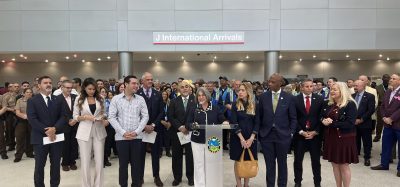A fair global policy response to COVID-19 is imperative, says ACI World
- Like
- Digg
- Del
- Tumblr
- VKontakte
- Buffer
- Love This
- Odnoklassniki
- Meneame
- Blogger
- Amazon
- Yahoo Mail
- Gmail
- AOL
- Newsvine
- HackerNews
- Evernote
- MySpace
- Mail.ru
- Viadeo
- Line
- Comments
- Yummly
- SMS
- Viber
- Telegram
- Subscribe
- Skype
- Facebook Messenger
- Kakao
- LiveJournal
- Yammer
- Edgar
- Fintel
- Mix
- Instapaper
- Copy Link
Posted: 19 March 2020 | International Airport Review | No comments yet
In response to the drastic impact of COVID-19 on the aviation industry, ACI World has suggested five global policy measures to alleviate the shortfall.


Angela Gittens, Director General of Airports Council International (ACI) World, has outlined ACI World’s position on the global policy response for the airport industry and the aviation ecosystem – highlighting its support for the calls made by ACI Asia-Pacific, ACI Europe, ACI North America, and ACI Latin America Caribbean for urgent supportive measures for airports.
The aviation industry has been and continues to be highly impacted by the COVID-19 crisis and, while airport operators remain first and foremost concerned with protecting the health and wellbeing of passengers who continue to choose to travel, it is important to note that they are also businesses in their own right. Operators have significant costs to bear, debts and obligations to fulfill, and services to deliver, even during a time of crisis.
The rapid spread of the virus, as well as the travel restrictions and contraction that have come with it, represents an unprecedented challenge for airport operators that has led to a severe drop in passenger traffic and demand and economic activity. The financial shortfall will be significant for businesses involved in the aviation ecosystem, with current estimates predicting airport industry losses of at least $20 million to up to $25 billion in revenues during 2020.
Gittens said: “There is a general sense across the aviation community that we are all in this together as this crisis continues to unfold. As the economic policy response is formulated, however, it is important to note that no measure or relief package should disproportionately benefit one sector at the expense of another. We should seek to ensure the impact of the COVID-19 pandemic on the aviation ecosystem is borne equitably and that all solutions are fair and reasonable so as to give the industry the greatest chance to recover quickly.”
As governments continue to make decisions on economic stimulus, ACI World has recommended the following policy measures in order to alleviate the shortfall for airports:
Protection of airport revenues
Airports are reliant on revenue from charges on airlines and passengers and from commercial activities (which play a key role to bridge the gap between airport costs and aeronautical revenue). Any global alleviation of airport charges or introduction of blanket discounts, therefore, will place airport operators in greater financial distress.
Alleviation of airport slots usage requirements
The temporary suspension of airport slot usage requirements would enable carriers to adjust their schedules in a sustainable way and for airports to protect connecting traffic at hub airports and help safeguard connectivity worldwide. ACI World favours an ongoing flexible reassessment of the situation, based on data-driven evidence.
Concession fee payments to governments
Governments need to consider, on a case-by-case basis, waiving airport rents and concession fees applicable to airport operators, irrespective of their ownership status, given the financial stress they are experiencing.
Tax relief for the aviation sector
ACI World believes that national authorities have now a key role to play to ensure the sustainability of the entire aviation ecosystem by granting relief on airport taxes, on passenger-based taxes, and on taxes on air transport in general to incentivise the return of passenger confidence to travel.
Government assistance
In some circumstances, seeking government assistance to help offset losses incurred by the sharp drop in travel due to the continuing outbreak can be an appropriate measure.
Regarding the suggested measures, Gittens added: “These policy responses aim to ensure the continuity and sustainability of airport operations in these exceptional circumstances. The aviation industry and governments should approach the prospects for recovery strategically, pragmatically, and in partnership.”
Related topics
Aeronautical revenue, Airport crisis management, COVID-19, Economy, Passenger volumes
Related organisations
Airports Council International (ACI World), Airports Council International Asia-Pacific and Middle East (ACI APAC & ME), Airports Council International Latin America & Caribbean (ACI-LAC), Airports Council International North America (ACI-NA)


















